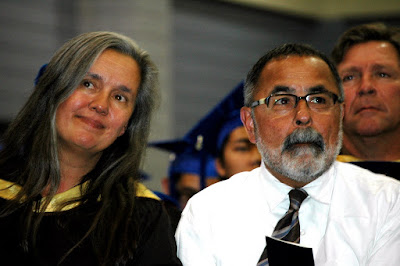APRIL 18, 2002
This
one’s gonna have to be brief.
Item
7 was something about “mini-certificates”: “many
students seeking competency in specific areas for employment or job advancement
do not wish to complete a whole certificate program. These under-eighteen-unit
certificates would allow students to demonstrate competency in a specific area
to employers….” (Agenda)
No one
could think of an argument against this proposal, and so it passed.
Item
8 concerned whether “students earning certificates at IVC [should] be included
in Commencement exercises.” I wondered whether the addition of these students
in the program might make an already-tedious program more so. The answer: there
are few such students, so “no.”
This passed
unanimously. In fact, on this day, everything passed, and everything passed
unanimously, always a healthy sign in a democracy (not!).
Item
3 concerned the speaker—Mark M—recommended for commencement by the Commencement
Planning Committee. (Passed. I have encouraged Mark to say something nasty,
but, thusfar, he seems determined to take the high road.)
Item
4 was committee appointments. At this point, Joe Ryan (of Chemistry) has been
nominated for the Instructional Delivery Task Force—the committee, as you will
recall, on which faculty are poorly
represented, despite the Faculty’s legal responsibility for “instructional
delivery.” No new nominations surfaced.
Item
5 was “plus or minus grading.” That we will be voting on this is a done deal;
the issue was only the adoption of “positions statements” regarding this thorny
issue.
Lewis
recommended emailing the positions statements to all faculty—and not including
them on the ballot.
Ray
wanted to know just what it was we (as a faculty, in the upcoming election)
were voting on. “Adoption of plus or minus grading,” said Lewis.
Ray
wanted to add something like: “at the sole discretion of class instructors.”
During
the subsequent discussion, Lewis maintained that, by state law, instructors
issue grades autonomously, and thus faculty cannot be told to use pluses and
minuses. Hence, we need not concern ourselves with whether plus and minus
grading will be imposed on faculty.
There
was some discussion re the ballot box—evidently, the box normally used is
unavailable. Rich noted that the fine Mas H has built something boxlike that
could serve as a ballot box. No, said Lewis, he was looking forward to building
a new box in his garage or something. He plans to add a “trap door,” he said.
We all laughed. Ray snickered.
Item
6 was the contentious “academic honesty policy” issue. Ray said he “despaired
of persuading anyone” that the policy lacks and thus requires a “definition of
academic dishonesty.” In the subsequent discussion, Ray was persuaded that, in
fact, the policy did offer a sort of definition, given a little restructuring.
The draft, thus modified, was approved.
Item
9 was a faculty “code of ethics.” Evidently, “The Chancellor has recommended
that the Senate discuss and adopt a professional code of ethics.” The Academic Affairs
Committee has recommended putting this matter on the back burner.
I
moved that we “not take action.” That passed unanimously. I was amazed.
Item
10 concerned a resolution to encourage faculty to participate in the
Commencement. Last year, said Lewis, only 12 faculty members showed up. It
looks as though faculty don’t give a damn, said Lewis. Yes, he added, some
faculty are registering a protest, but it remains true that an unfortunate
impression is left with the students.
Miriam
asserted that she’d show up if she didn’t have to don the “witch costume.”
Let’s add “clothing optional” to the
resolution, said Rich, that wag. “That might keep me away,” retorted Lewis.
The
issue of food came up, cuz somebody thought we oughta have some kind of reception
before the ceremony. Evidently, recently, the board has decided never to allow
the expenditure of district funds for food at functions.
Ever alert, I asked
about the upcoming “reception” to welcome Raghu Mathur as Chancellor, which
will be held at Cannons Restaurant in Dana Point. “Will that function have
food?” I asked.
“I
think it will,” said Lewis.
“Oh,
an exception,” said I. Dale-Ray
groaned.
Item
11 was something about the upcoming election, but, by then, I had fallen into a
deep coma.
“Please
vote,” said Lewis, I think.
Lewis
mentioned that, at the last senate meeting of the semester, there would be a
joint session. At that time, the two senates would perhaps pass a resolution to
urge the State Chancellor and the Board of Governors to enforce AB1725—the
legislation that requires delegation of authority (by the board) to the
Academic Senates. As you know, the Board Majority has repeatedly violated that
law. It turns out that Diablo College is experiencing some of the same “shared
governance” problems as our district, and somebody from that college is on the
Board of Governors.
During
his President’s Report, Lewis said something about “streamlining” the speaking
at Commencement. Something about two minutes.
Lewis
mentioned that, now that Tom Perez has retired, AOJ is “floundering.” He needs
to be replaced.
Also:
Mathur is soliciting “fresh ideas” for use of the Tustin facility. Evidently,
that property sports crummy buildings that need to be torn down—at great
expense.
After
the meeting, I asked how it came about that Mr. Larry Oldewurtel was selected
as “Teacher of the Year.” Evidently, Mr. Kuo, the President of ASIVC, assures
everyone that a “democratic” process yielded that result. I have been told,
however, that, normally, the most recent “Teacher of the Year” is involved in
the selection process. In this instance, that person was not invited to
participate.
Gotta
jet. Bye.
—ROY



